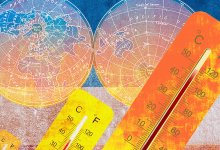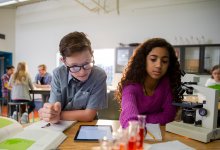Science
Explore and share tips, strategies, and resources for helping students develop in science.
Guiding Students to Ask Questions and Define Problems in Science
Teachers can use these strategies to help students in grades 6 to 12 develop skills that are crucial to scientific study and exploration.280Using PBL in Environmental Science Class
Project-based learning and an apprenticeship model helped garner community support when students decided to open a rural county’s first recycling center.Exploring Before Explaining Sparks Learning
New elementary science teachers can build student engagement and enhance learning by using the explore-before-explain approach.Using Place-Based Learning to Teach Middle School Students About Climate Change
Climate change lessons become more relevant to students when they learn about how it’s affecting their communities.144Using Skills to Grade Proficiency in Science
Proficiency scales provide an excellent way to evaluate students on their scientific knowledge and skills.412Why Students Should Write in All Subjects
Writing improves learning by consolidating information in long-term memory, researchers explain. Plus, five engaging writing activities to use in all subjects.16.5kDesigning Interdisciplinary Units in Elementary School
This eight-step framework can help teachers create units that integrate science and social studies with math and English language arts.331Teaching the Concept of Equity Through Gardening
Plants can illustrate how different people need different things to be nourished—and how equality and equity differ.9.7kUsing Picture Books to Teach Children About Large Numbers
These strategies help elementary students grapple with the very large numbers involved in talking about time and space.296Using Learning Progressions to Guide Science Teaching
Teachers can use learning progressions to give students a framework to build on their science knowledge, fostering curiosity and enthusiasm.2782 Ways to Encourage Better Note-Taking
Do your high school students think that taking notes during class means writing down everything you say? You can teach them effective note-taking skills that increase their engagement.711Looking for Joy and Wonder in Science Class
Focusing on fun during science lessons can help elementary students develop more curiosity about the world and engage more deeply in learning.3753 Ways Instructional Coaches Can Support Early Elementary Teachers in Science
An inquiry-based, immersive approach can spark early elementary teachers’ enthusiasm for teaching this critical subject.211How to Use the 5E Model in Your Science Classroom
An inquiry-focused method gives students a way to connect scientific ideas to their experiences and apply their learning.3.2kDesigning Science Inquiry: Claim + Evidence + Reasoning = Explanation
The Claim, Evidence, Reasoning framework is a scaffolded way to teach the scientific method.27.2k













